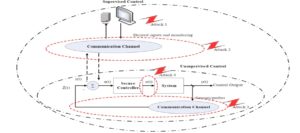Summary:
Networked control systems (NCSs) are created by the integration of advanced communication networks, control systems, and computation techniques. This integration enhances efficiency and reliability at the expense of increased complexity and reduced security . For example, the reliance of NCSs on communication networks exposes these systems to attack vectors targeting generic networks. RANCS focuses on resilient design of NCSs under faults, failure and attacks. We focus on mathematical framework for an NCS under common types of attack is presented, i.e., denial of service (DoS), false data injection (FDI), and time delay switch (TDS) attacks. Thereafter, the framework is used to developed attack detection and resilient control and communication methods such as designing an algorithm based on adaptive channel allocation and state estimation techniques to compensate for the destabilizing effects of attacks.
Selected publications:
- Sargolzaei, Arman, and Mohamed Abdelghani. “Detection of and responses to time delays in networked control systems.” U.S. Patent 9,946,231, issued April 17, 2018.
- Sargolzaei, Arman, Alireza Abbaspour, Mohammad Abdullah Al Faruque, Anas Salah Eddin, and Kang Yen. “Security Challenges of Networked Control Systems.” In Sustainable Interdependent Networks, pp. 77-95. Springer, Cham, 2018.
- Khalghani, Mohammad Reza, Sarika Khushalani-Solanki, Jignesh Solanki, and Arman Sargolzaei. “Cyber disruption detection in linear power systems.” In Power Symposium (NAPS), 2017 North American, pp. 1-6. IEEE, 2017.
- Abbaspour, Alireza, Arman Sargolzaei, and Kang Yen. “Detection of false data injection attack on load frequency control in distributed power systems.” In Power Symposium (NAPS), 2017 North American, pp. 1-6. IEEE, 2017.
- Sargolzaei, Arman, Kang Yen, Mohamed Abdelghani, Alireza Abbaspour, and Saman Sargolzaei. “Generalized attack model for networked control systems, evaluation of control methods.” Intelligent Control and Automation 8, no. 03 (2017): 164.

